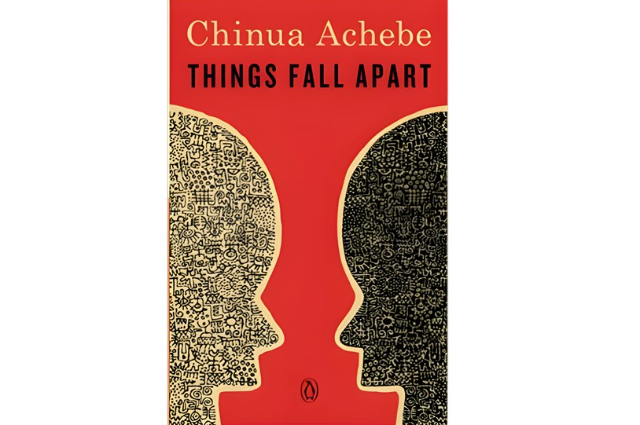
This essay aims to prove that in Chinua Achebe’s “Things Fall Apart”, Okonkwo’s tragic flaw was not his fear of turning into his father or looking weak, but his anger towards his father’s lack of success and respect. The first argument of this essay will aim to prove the existence of Okonkwo’s anger towards his father using textual evidence. The second argument will highlight Okonkwo’s desire to spite his father using methods of violence to achieve his goals; the opposite of what his father did. The last argument will focus on Okonkwo’s downfall, and how his clansmen did not support Okonkwo’s violent methods that he had been using to spite his father.
Okonkwo and Unoka’s relationship is one of the main themes in Chinua Achebe’s “Things Fall Apart”. Even though Unoka is physically absent in the novel, his relationship with his son is meticulously described. Unoka is depicted as a lazy and irresponsible individual, falling into debt and disgracing his family. He receives a lot of disrespect and shame from his community, and Okonkwo carries the burden of being a son to someone like Unoka. It is assumed that Okonkwo lives in fear of turning into his father, and the fear drives Okonkwo to kill himself. This essay, however, aims to prove that it wasn’t fear, but anger that led to Okonkwo’s demise.
Chapter three, page fourteen states, “With a father like Unoka, Okonkwo did not have the start in life, which many young men had.”
Unoka was an incompetent father and was looked down upon by his community. Cindy Greer’s midterm discussion paper of February 2002 states “Okonkwo was embarrassed and humiliated by his father, as he did not live up to Igbo cultural expectations of hard work and acquisition of wealth to attain social status and respect to the point of a shameful death. He so despised his father and his father’s indolence that Okonkwo did everything within his power to become the opposite of Unoka.” Greer’s perspective of Unoka’s depiction can be corroborated by textual evidence. Chapter one, page four states “Unoka was a failure. He was poor and his wife and children had barely enough to eat.” Greer’s observation of Okonkwo’s embarrassment regarding his father can also be backed by textual evidence. Chapter two, page eleven states “Even as a little boy he [Okonkwo] had resented his father’s failure and weakness.” It is assumed that Okonkwo always acts out of fear of turning into his father, but the aforementioned lines prove that Unoka’s image in society and incapability to provide for his family angered Okonkwo, and his actions were dictated by anger rather than fear.
Okonkwo’s usage of violence is characterized as the effect of his fear of looking weak. However, it was not his fear, but his desire to spite his father that caused him to use violence. Unoka was a pacifist and despised violence and blood. Okonkwo, knowing this, counteracted and used violence, something that Unoka would have hated. Liz Breazeale’s lesson on Unoka states “Okonkwo feels a desperate, even damaging, need to escape his father and to be the opposite of Unoka….so badly does Okonkwo want to never become his father that it leads him to kill, and to wind up killing himself.” Chapter two, page eleven states “Okonkwo was ruled by one passion- to hate everything that his father Unoka had loved.” Out of this passion, Okonkwo used violence to go against his father’s pacifist ideology. One may argue that violence was normalized in the Igbo culture, and Okonkwo was merely following the traditions of the society. There is textual evidence, however, that proves that Okonkwo used violence regardless of the society’s traditions. Chapter four, page 22 states “he [Okonkwo] beat her [Ojiugo (Okonkwo’s wife)] very heavily. In his anger, he had forgotten that it was the Week of Peace.” The aforementioned lines prove that Okonkwo did not use violence out of fear of looking weak, or because of the normalization of violence in the Igbo culture, but only because using violence was something Unoka would never do.
Okonkwo’s downfall is one of the main events in the novel. When Okonkwo realises that his clansmen did not support his act of killing the messenger, he thinks that everything is falling apart, and eventually hangs himself. Okonkwo had been using violence for a long time to spite his father since he resented him and his non-violent, pacifist methods. However, upon realising that his clansmen were in fact against his violent methods, he concluded that they all supported non-violence. Okonkwo thought that the methods of his father were considered better than his own by his clansmen. The fact that he worked all his life going against Unoka, and in the end did not gain his clansmen’s support made him angry to the point where he decided to end his own life. It was not the feeling of betrayal by his clansmen that drove him to kill himself, but the anger that his father’s methods were considered better.
In conclusion, fear was not Okonkwo’s tragic flaw and did not lead to his demise. It was his resentment and anger that caused him to kill himself.
. . .
Citations:
- Cindy Greer, midterm discussion paper: web.cocc.edu
- Liz Breazeale, lesson: study.com/academy/lesson
